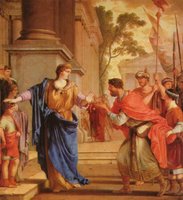 "All history is biography," said Emerson, and he's certainly right in thinking that an understanding of the lives of individual men and women is essential to history. Fortunately for us, many ancient writers shared Emerson's idea of the importance of biography, and they've left us many fascinating accounts of important Roman leaders. Among the most interesting biographies are those contained in Plutarch's "Lives of the Noble Greeks and Romans." Please read one of the following selections from Plutarch. Cite an incident or sentiment that seems to you particular important in understanding Roman character/values/history, and explain why you chose this particular passage/event.
"All history is biography," said Emerson, and he's certainly right in thinking that an understanding of the lives of individual men and women is essential to history. Fortunately for us, many ancient writers shared Emerson's idea of the importance of biography, and they've left us many fascinating accounts of important Roman leaders. Among the most interesting biographies are those contained in Plutarch's "Lives of the Noble Greeks and Romans." Please read one of the following selections from Plutarch. Cite an incident or sentiment that seems to you particular important in understanding Roman character/values/history, and explain why you chose this particular passage/event.Abridged versions:
Tiberius Gracchus, Gaius Gracchus, Fabius Maximus, Cato the Elder, Camillus
Unabridged versions:
Tiberius Gracchus, Gaius Gracchus, Fabius Maximus, Cato the Elder, Camillus
Right in the beginning the story states that Fabius was a man of great courage and strength. This man was consul five times and lead many victories for Rome. During the time of Fabius a man named Hannibal was invading parts of the Roman empire and the Roman people feared for their lives for Hannibal was getting closer and closer into Roman land. Hannibal won many battles against Rome but Fabius used his wise words to convince the Roman people that heaven was on their side and that they needed to please the gods. The Romans value success and value victory quickly. The Roman people called Fabius a coward for taking so long in trying to defeat Hannibal's army. With all of the losses that Fabius accrued during his reign he was ultimately called a coward and an incompetent general. Roman's value strength and confidence in the battlefield and they value winning battles instead of losing them. I chose this particular passage because it shows us how the Romans valued the people who were in charge. In Fabius' case he was not valued at all. His character was the opposite of what the Romans wanted to be.
ReplyDeleteThe passage I've chosen is as follows:
ReplyDelete"The city, however, being taken by storm, and the soldiers busied in pillaging and gathering an infinite quantity of riches and spoils, Camillus, from the high tower, viewing what was done, at first wept for pity; and when they that were by congratulated his success, he lifted up his hands to heaven, and broke out into this prayer: "O most mighty Jupiter, and ye gods that are judges of good and evil actions ye know that not without just cause, but constrained by necessity, we have been forced to revenge ourselves on the city of our unrighteous and wicked enemies. But if, in the vicissitude of things, there may be any calamity due, to counterbalance this great felicity, I beg that it may be diverted from the city and army of the Romans, and fall, with as little hurt as may be, upon my own head." Having said these words, and just turning about (as the custom of the Romans is to turn to the right after adoration or prayer), he stumbled and fell, to the astonishment of all that were present. But, recovering himself presently from the fall, he told them that he had received what he had prayed for, a small mischance, in compensation for the greatest good fortune."
There are a couple of things here that the Romans held in high regard. The first is the quickness in which he turned to the Gods. Romans, if I remember correctly, highly value them and believe that their success was tied to their reverence. By Camillus quickly realizing that they are obtaining too much and asking the gods to take any misfortune out on himself, he is not only placing the Gods' favor above his own well-being, but he is also placing his men's lives above his own well-being. When a country is in war long enough, they won't stand for a leader that won't protect them.
Finally, in this second alone, he is intrinsically tying the two together - he places both his men and the Gods before himself, both of which are incredibly important to the Romans.
In a later passage, he also asks if he can move the statues of the Goddess Juno, only moving her when she apparently agrees. Again, his reverence to the gods could be believed to have contributed to his military success and reinforced the beliefs that Romans had of both topics.